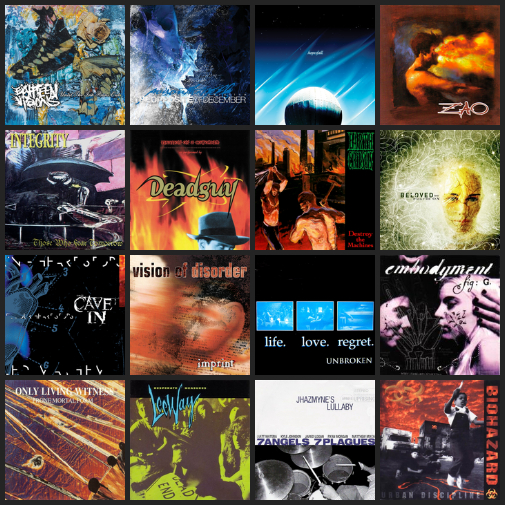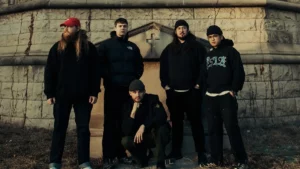
If you examine the majority of popular post-hardcore and metalcore bands of the last decade or so, most of them are indebted in some way to the bands of the distant past. This is by no means a bad thing – you don’t necessarily have to break new ground to be an important band. History almost always relies on the recent past, especially regarding trends in music.
However, there’s a number of albums that you can clearly draw connecting lines to and from in the proverbial sand. Clear band/album influences in the current climate are there if you know where to look – what albums influenced such disparate bands like Motionless In White, Turnstile, and Norma Jean? The answers, of which there are many, are a little deeper than you’d think. We touched on the history of the genre a while back right here, but examining the roots of the tree is a bit more important – so let’s begin. Our criteria includes records released from 1989-2004, when the roots of the genre were still taking shape, so you’ll find important formative records here – but also a few somewhat recent ones that are super important as well. Please note this is not a comprehensive or ordered list, and there’s actually 16 albums + a couple bonus ones. There’s just so much to tackle here.
Honorable Mentions // Obvious choices that most people know:
Converge (pretty much everything)
Bane/Refused (pretty obvious)
Coalesce (Functioning on Impatience, 1998)
Botch (We Are The Romans, 1999)
Taken (Between Two Unseens, 2004)
Skycamefalling (Skycamefalling, 2000)
Snapcase (Progression Through Unlearning, 1997)
Codeseven (Dancing Echoes / Dead Sounds, 2004)
Deadguy (Fixation on a Coworker, 1995)
Best 30 minutes of your life right here. Trust us.
Only Living Witness (Prone Mortal Form, 1993)
One listen to the 36 minute long Prone Mortal Form and you’ll wonder how and why Only Living Witness didn’t get absolutely massive in the early to mid-’90s. They had all the tools for success – strong vocals, good songwriting, and a really accessible sound that is somewhere between alternative metal, sludge metal, and hardcore. Shadows Fall even did a cover of the song “December” a decade ago, and it’s really that Boston scene of metal and hardcore (SF, KSE) that’s indebted to what Only Living Witness did in the early ’90s. Prone Mortal Form is hardcore you can sing along to.
Beloved (Failure On, 2003)
Almost anyone who grew up in the early 2000’s post-hardcore scene knows groundbreaking and popular bands like Thursday and Thrice, who mixed the vulnerability of emo with the passion of post-hardcore – but one album that many often overlook is Beloved’s first (and only) album, Failure On. Bands like Underoath, From First To Last, and As Cities Burn are indebted to the foundation Beloved left behind on just one record. For the fans of the heavier side of post-hardcore, there’s plenty of breakdowns (unpredictable ones, which is great), and members of Beloved went on to form Advent, who are also golden.
Leeway (Desperate Measures // Born To Expire, 1991/1989)
Every modern band that plays a style of hardcore merged with thrash influences (Eternal Sleep, Terror, Turnstile) basically owes most of their sound to Leeway’s first two records. 1989’s Born To Expire was an important slice of crossover thrash, but 1991’s sophomore effort Desperate Measures dropped most of the hardcore sound and replaced it with more thrash a la Testament – but also includes primitive rap/hip-hop influences near the end of the album. These influences don’t take away from the album, though – if anything, they make Leeway a bit more diverse.
You can easily find the band’s influence in Hatebreed and especially Terror, whose thrash-influenced hardcore career carries heavy influence from Leeway. Turnstile is another band that Desperate Measures has a massive, understated influence on.
7 Angels 7 Plagues (Jhazmyne’s Lullaby, 2001)
Released near the tail end of 2001, metallic hardcore band 7 Angels 7 Plagues may have been a shortlived project, but the band’s one full-length, Jhazmyne’s Lullaby, was a massively influential slab of metalcore that was a huge influence on the bands that came after them. Sometimes all it takes is one album to change the world, and the bright melodies and pounding drums of 7 Angels 7 Plagues lives on in Misery Signals – but this one changed the game.
Hopesfall (The Satellite Years, 2002)
Good luck finding post-hardcore and metalcore bands that aren’t at least slightly influenced by The Satellite Years, Hopesfall’s spacey metalcore magnum opus. Essentially, no bands were doing what Hopesfall did between, say, 1999-2003ish – merging Hum-esque space rock with the heaviest of post-hardcore and metalcore simply wasn’t something bands did. Songs like album closer “The Bending” and the melodic brutality of “Decoys Like Curves” were completely unique at the time, and August Burns Red vocalist Jake Luhrs cites the album as being a vital one for him.
Cave In (Until Your Heart Stops, 1998)
Slayer-influenced thrash meets a hardcore foundation. Kind of. Cave In’s arguable best records came later (2000’s total space rock shift Jupiter and 2003 follow-up Antenna), but none was more influential than 1998’s Until Your Heart Stops. The chugging start-stop rhythms are there, and the band’s influence loomed large over many of the bands who mimicked this style in the early 2000’s.
Vision Of Disorder (Imprint, 1998)
Another case of being too far ahead of their time, Vision Of Disorder were surely confounding. Were they hardcore? Metalcore? Hardcore punk? Alternative metal? They were all of these things, and a bit more. Alongside bands like Eighteen Visions, they were one of the first bands of their time to actually sing too, except they arguably did it first. That being said, Vision Of Disorder were never soft. If the opening 20 seconds of “Twelve Steps To Nothing” doesn’t make you want to spinkick the nearest heavy object, you’re doing it wrong.
The band eventually went on to form Bloodsimple, who got pretty big for a time, but broke up. VOD is still alive and kicking, though, and the band’s last two records have been borderline masterpieces. Seriously, though, VOD deserved (and still deserves) your attention for being ahead of the curve by a few years.
Eighteen Visions (2000-2002: Until The Ink Runs Out // Vanity)
God bless Trustkill Records. Both these records took metalcore in a bold, new direction – especially Vanity, with songs like moshpit anthems “You Broke Like Glass” and the ferocious “One Hell Of A Prize Fighter” (hey, a Howard Jones guest spot!!!). But what signaled the band’s coming evolution was the 3 minute long acoustic ballad “Gorgeous”, which would have fit really well on their next two records.
Integrity (For Those Who Fear Tomorrow, 1991)
1991’s For Those Who Fear Tomorrow might well be the first legitimate metalcore record. MICHAAAAAAAAAAAAAAAAAAAA!
Unbroken (Life. Love. Regret. 1994)
Underrated hardcore masterpiece that was 5, possibly 10 years ahead of its time. Anyone who claims to love even current hardcore and metalcore needs to listen to Unbroken – truly a special record for a special moment in time. Bands like Close Your Eyes and Worthwhile were modern torchbearers of the sound Unbroken pioneered.
Earth Crisis (Destroy The Machines, 1995)
Straight-edge. Vegan. Metalcore.
Zao (Where Blood and Fire Bring Rest, 1998)
Without Zao, there is no Underoath, none of the bands that Underoath inspired, and the entire timeline of Christian metalcore/hardcore is altered forever. This is how important Where Blood and Fire Bring Rest is.
Embodyment (Embrace The Eternal, 1998)
Another primitive deathcore influence – except they were Christian, too. If they had been around 10 years later, they’d be up there with the Suicide Silences and Whitechapels of the world.
Biohazard (Urban Discipline, 1992)
Hip-hop, thrash metal, and hardcore collide on Biohazard’s 2nd full-length album. Urban Discipline was a revelation in 1992 – even more so when you consider some of the bands spawned and influenced by the album (Limp Bizkit, endless seas of nu-metal bands).
Poison The Well (The Opposite Of December, 1999)
Another total gamechanger that redefined what hardcore did and what it was supposed to sound like. “Nerdy” will make you feel things.
Epilogue
There’s plenty of other great hardcore and metalcore albums that are highly influential that we didn’t have time for. Did we miss any? Ping us via the comment section and let us know.




More Stories
Knocked Loose’s “Don’t Reach For Me” has entered Spotify’s USA Viral 50 chart
An underrated Deftones song from ‘Saturday Night Wrist’ is getting more attention, thanks to their Coachella performances
Brothers in Music: The Unforgettable Journey of the Chrisagis Brothers